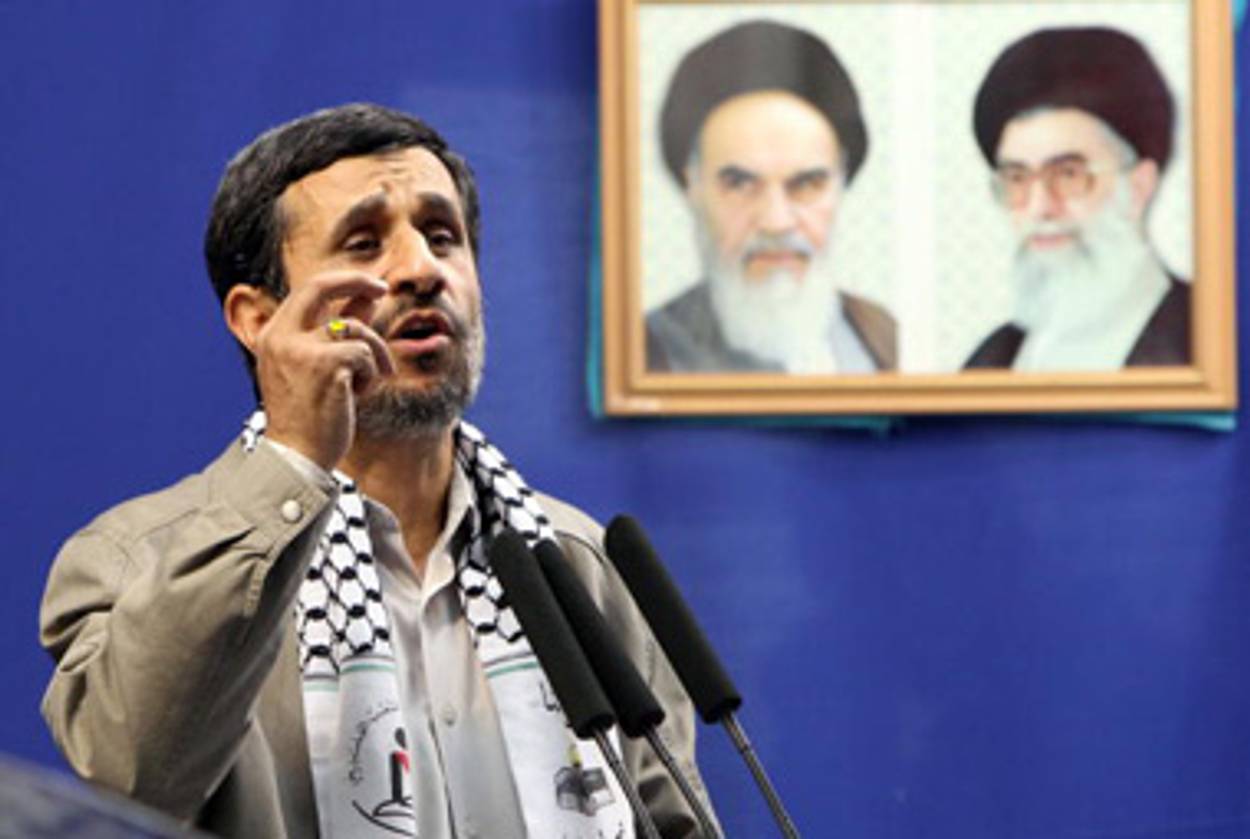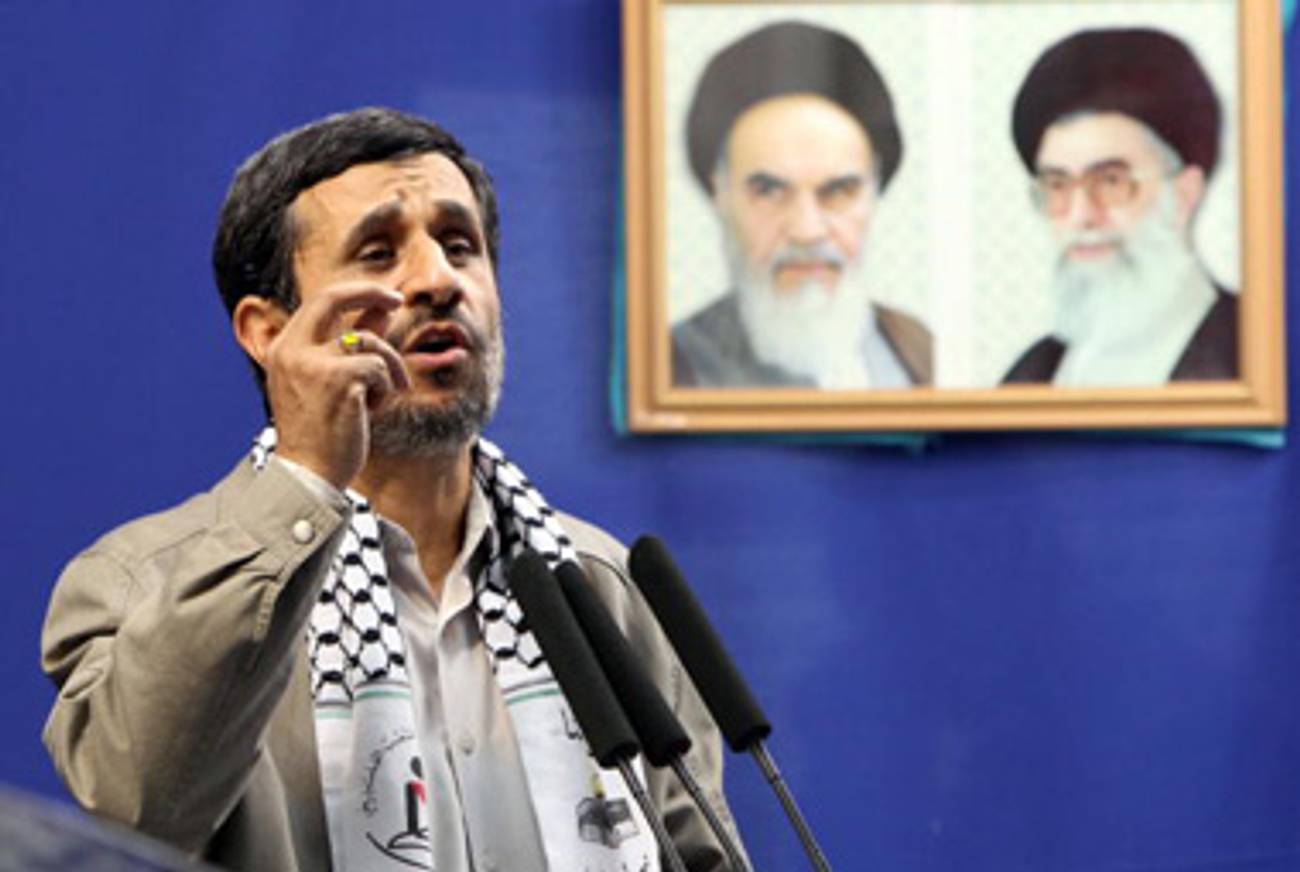The Two Mahmouds Snipe Over Direct Talks
Why Iran fears the peace process




The new round of Israeli-Palestinian direct peace talks between Prime Minister Netanyahu and President Abbas are “death,” said one other leader last Friday. “Who does Abbas represent? Who gave him the mandate to negotiate on behalf of the Palestinians? What will they talk about—Palestine? Who has the right to surrender parts of Palestine to the enemy?” Leaving aside the substance of the argument, more notable is who made it: Mahmoud Ahmadinejad, at the annual “Quds Day” rally—a massive pro-Palestinian, anti-Israeli gathering. (To be sure, the Iranian president also offered the usual charming exhortations to prepare for the “final and decisive battle” against Israel.)
Abbas did not take this lying down. “He who does not represent the Iranian people, suppresses the Iranian people, and took power by fraud, has no right to talk about Palestine, its chairman or his representatives.”
We know Ahmadinejad is against Israel. But beyond the pure ideology behind the talks (the fact that talking to Israel acknowledges its existence and, implicitly, legitimacy), why is Ahmadinejad so down on them? Palestinian Prime Minister Salam Fayyad, backing up Abbas’s line, hit the nail on the head: “The Iranians have been taking this aggressive line against the Palestinian Authority all along,” he said over the weekend, “and they have been supporting Hamas, the opponent of the Palestinian Authority.”
This is about Hamas, Iran’s proxy, and its rivalry with Abbas’s more moderate Palestinian Authority. Hamas, under tacit Iranian support, has tried to sabotage the talks with a series of West Bank attacks, including one last week that killed four Jews; these attacks have in turn prompted the P.A.’s arrest, under Fayyad’s lead, of hundreds of Hamas operatives and sympathizers. If the talks are seen as bringing good things to Palestinian residents of the West Bank—a big if, of course, but that is at least the idea—then that makes Hamas look bad. More importantly, though, Hamas’s (and Iran’s) ideology is one that essentially cannot accept the state of Israel.
But there is more: No matter what the talks and concessions mean for the P.A., for Israel they almost certainly mean increased U.S. support: In fact, Israel is reportedly seeking an arms package should it make peace Abbas. You do not have to be a regional expert to know which rival would be most threatened by further U.S. support: Iran. (Indeed, an expert close to the Obama administration has already suggested buttressing U.S. military aid and support to Israel in order to deter an Israeli strike on Iran.) Palestinian peace, the Iranian nuclear question: They are all connected, particularly given that Arab states like Jordan and Egypt—which are energetically backing the direct talks—share Israel’s fear of Iran, in a way that actually makes peace more likely.
It is easy to see the Israeli-Palestinian situation as a fairly binary one. One side wants borders here; the other wants them over there. One side wants a right of return for Palestinian refugees; the other doesn’t. One side wants Jerusalem to be one thing; the other wants it to be a different thing. But this simple view is immediately and hugely complicated by the fact that there is no one Palestinian leadership—Hamas is arguably more popular in the West Bank than Abbas’s Fatah, and in fact rules Gaza—and then further complicated by the Iranian nuclear issue, which is Netanyahu’s main focus and which affects how Hamas acts.
The good news this byzantine web brings is that, when there are enough actors with enough competing interests, occasionally you can bring a few of them together around a common goal. Regarding Iran, that is the peace-processors’ hope—and Iran’s fear.
Abbas vs. Ahmadinejad [JPost]
Day of Anti-Israel Protest Reveals Iran’s Internal Rift [WSJ]
Hamas Attacks Show Group Is Still Strong in West Bank [WP]
U.S. May Give Israel Arms in Exchange for Concessions [JPost]
Iranian Threat May Be Boon for U.S. Peace Talks [WP]
Earlier: Expert Argues for Accepting Nuclear Iran
Marc Tracy is a staff writer at The New Republic, and was previously a staff writer at Tablet. He tweets @marcatracy.